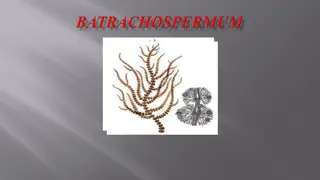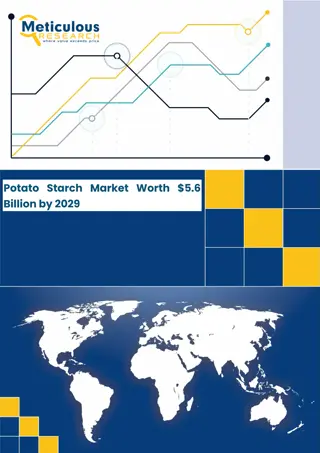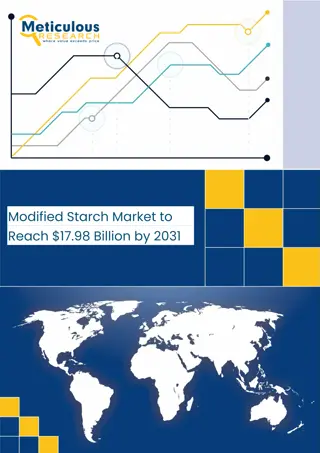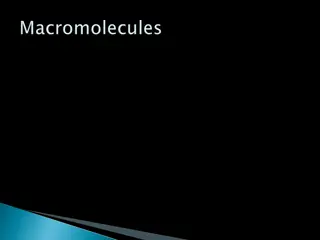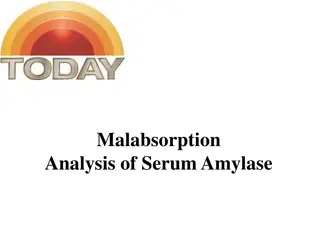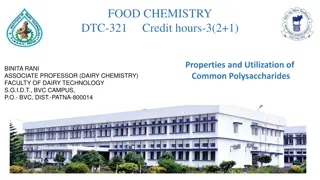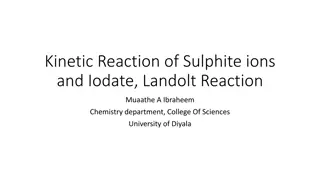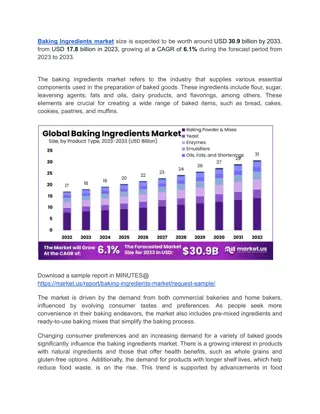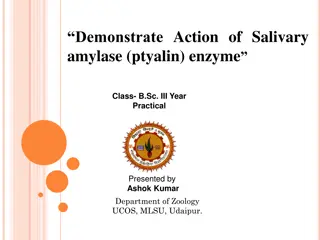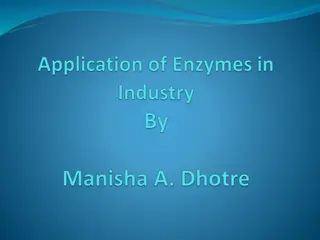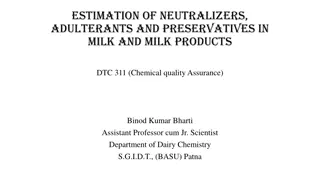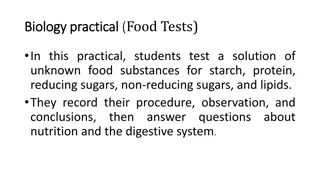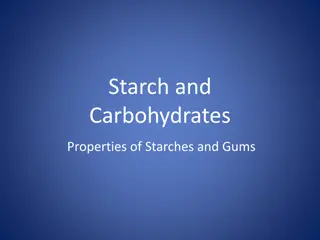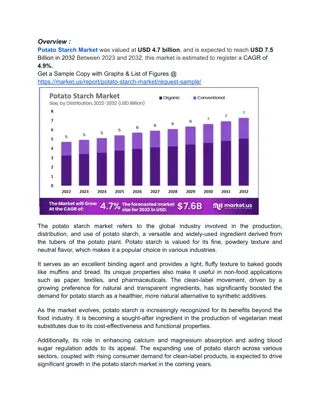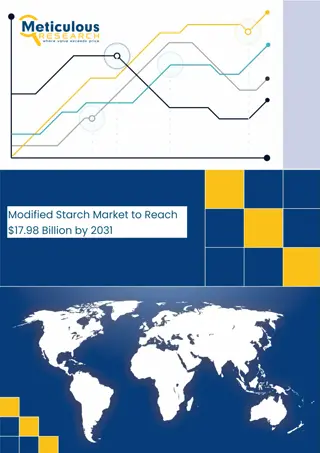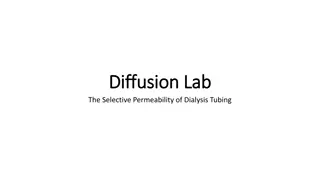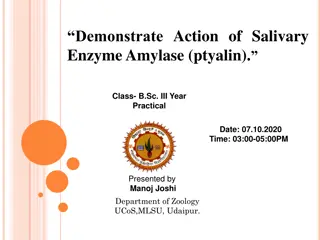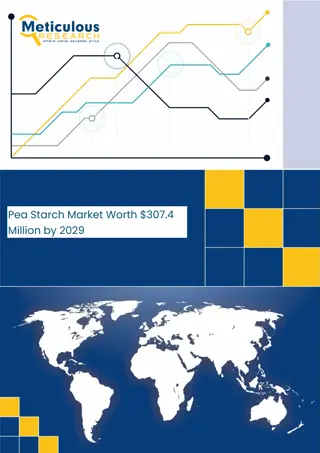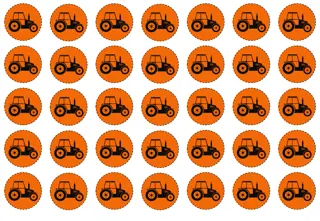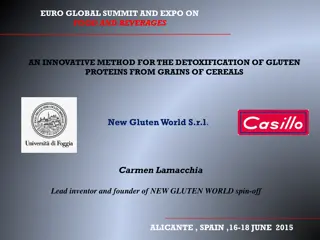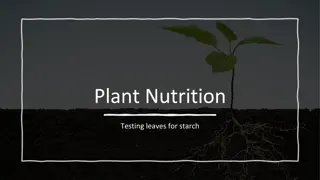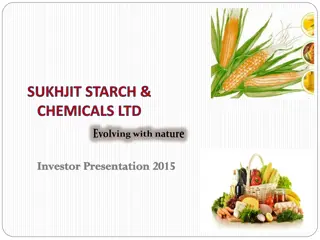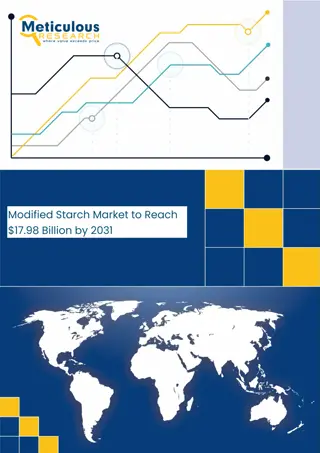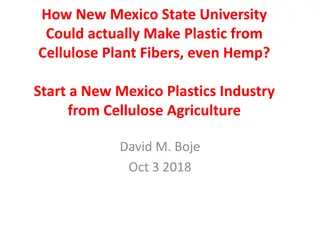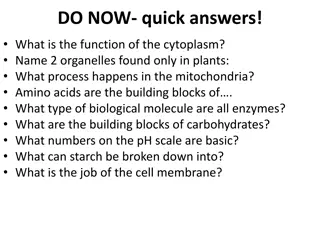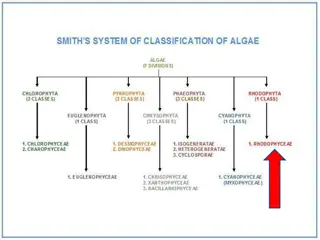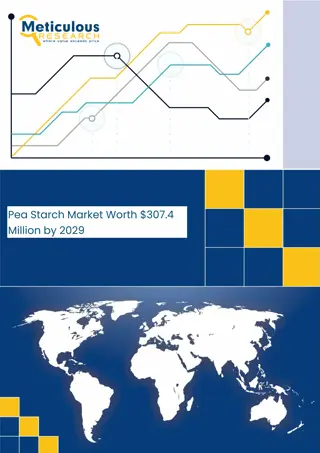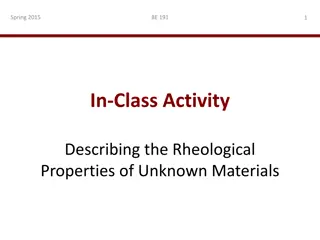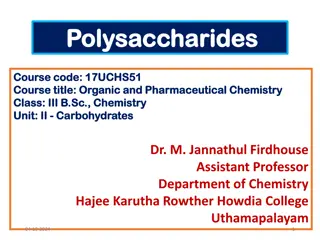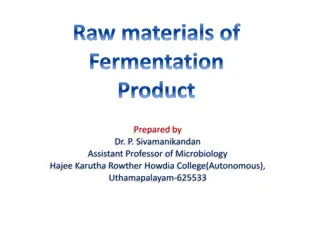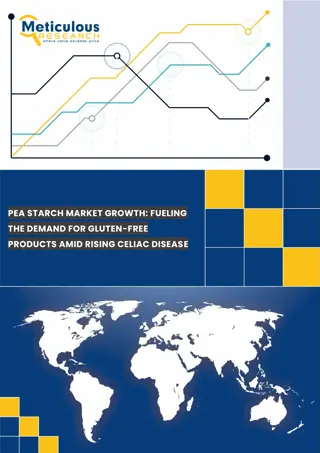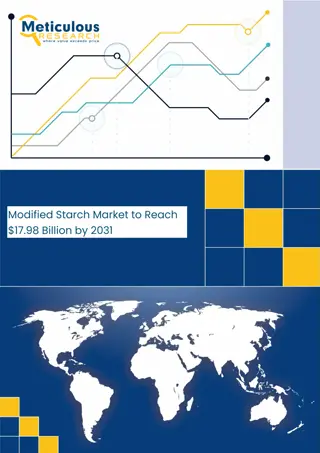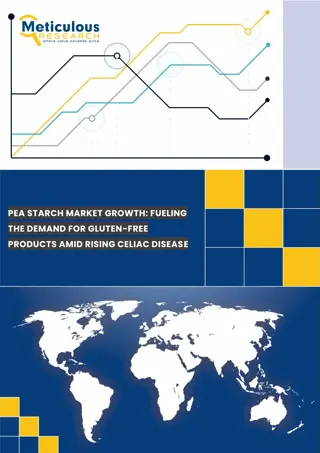Clean Label Ingredients Market
Clean Label Ingredients Market by Ingredient Type (Flours, Colors, Flavors, Preservatives, Starch), Source (Plant-Based), Form (Dry Form, Liquid Form), Application (Food (Bakery and Confectionery, Meat Products) and Beverages) - Global Forecast to 2030\n
1 views • 2 slides
Adhesives which harden without chemical reaction
Adhesives can harden without a chemical reaction, using water-soluble materials, or through the loss of solvents. Environmental pressures are leading to the development of water-based adhesives to replace solvent-based ones. Various adhesives like neoprene adhesives and starch-based pastes offer dif
3 views • 17 slides
Batrachospermum: A Freshwater Red Alga
Batrachospermum, a red alga commonly found in freshwater habitats like streams, ponds, and lakes, is characterized by its beautiful, gelatinous thallus structure. The plant body grows up to 15-20 cm and exhibits varying colors based on light exposure. Its thallus is differentiated into prostrate and
3 views • 17 slides
Modern Trends in Adhesives Development
Adhesives industry is evolving to meet environmental and safety regulations by developing water-based systems and reducing the use of solvents. Water-soluble materials are being used in adhesives, as well as adhesives that harden by loss of solvent or water. Different types of adhesives like contact
0 views • 17 slides
Potato Starch Market Worth $5.6 Billion by 2029
The potato starch market is projected to reach $5.6 billion by 2029, at a CAGR of 3.9% from 2022 to 2029.\n
1 views • 4 slides
Modified Starch Market to Reach $17.98 Billion by 2031
Explore $17.98 billion Modified Starch Market: Get exclusive insights on key market trends, segments, geographical analysis, & competitive analysis!\n
1 views • 5 slides
Carbohydrates in Living Organisms
Carbohydrates, along with proteins, lipids, and nucleic acids, are essential macromolecules in living organisms. They are made up of carbon, hydrogen, and oxygen in a 1:2:1 ratio. Carbohydrates provide the main energy source for living things, with examples including glucose, fructose, and sucrose.
0 views • 58 slides
Amylase: Sources, Functions, and Clinical Significance
Amylase is an essential enzyme found in saliva, pancreatic juice, and plants that aids in the breakdown of starch into sugars. This article explores the sources, physiological actions, and diagnostic uses of amylase in clinical practice, focusing on conditions such as acute pancreatitis. It also del
0 views • 22 slides
Properties and Utilization of Common Polysaccharides in Food Chemistry
Polysaccharides are carbohydrates with more than 10 monosaccharide units, commonly found in foods like starch, cellulose, glycogen, hemicellulose, and pectic substances. Starch, a natural polymer of D-glucose, is a major energy source in the human diet, present in cereals, roots, and tubers. It cons
0 views • 22 slides
Investigating Amylase Activity in Starch Digestion
An investigation on amylase activity involving the digestion of starch was conducted, with methods for controlling temperature, calculating digestion rates, and improving data precision discussed. The effects of temperature on enzymatic activity and precision enhancement techniques were explored.
0 views • 47 slides
Kinetic Reaction of Sulphite and Iodate - Landolt Reaction Overview
The kinetic reaction of sulphite ions and iodate in the Landolt reaction is a fascinating chemical process where slow and fast reactions occur sequentially, resulting in a visually striking color change. By monitoring the induction period between the two reactions, one can observe the formation of h
0 views • 9 slides
Emulsifiers and Leavening Agents See Significant Growth in Baking Sector
Baking Ingredients Market By Product Type (Emulsifiers, Yeast, Enzymes, Baking Powder And Mixes, Oils, Fats, and Shortenings, Colors And Flavors, Starch, Preservatives, Others), By Application, (Bread, Cookies and Biscuits, Cakes and Pastries, Rolls and Pies, Other End-Uses), By Region and Companies
0 views • 4 slides
Demonstration of Salivary Amylase Enzyme Action in B.Sc. Practical
Salivary amylase, an enzyme found in saliva, partially hydrolyzes starch into maltose. This practical involves observing the action of salivary amylase on starch, demonstrating how starch is broken down into glucose and maltose. The procedure includes preparing solutions, collecting saliva, mixing w
0 views • 5 slides
Enzymes in Industrial Processes: Applications and Benefits" (58 characters)
Enzymes play a crucial role in various industrial processes, such as denim bleaching, food production, brewing, and more. They are used for enhancing efficiency, achieving desirable outcomes, and creating innovative products in industries like food, dairy, starch, brewing, and paper. Enzymes like am
0 views • 16 slides
Milk Quality Assurance: Detection of Neutralizers, Adulterants, and Preservatives
This study focuses on techniques for estimating neutralizers, adulterants, and preservatives in milk and milk products, including tests for Rosalic Acid, alkalinity of ash, sugar, starch, and glucose. Each test involves specific procedures using apparatus and reagents to detect the presence of certa
0 views • 17 slides
Food Tests in Biology Practical
In this biology practical, students test a solution of unknown food substances for starch, protein, reducing sugars, non-reducing sugars, and lipids. They conduct various tests, record observations, and draw conclusions. The preparation of chemical solutions such as Benedict's solution, copper sulfa
0 views • 45 slides
Starch and Carbohydrates in Food Science
Explore the properties of starch and gums, the characteristics of starches like amylose and amylopectin, important processes such as gelatinization and retrodegradation, factors affecting starch gelatinization, and a lab experiment to investigate the factors impacting the thickness of cooked starch
0 views • 14 slides
The Hydrolytic Activity of Salivary Amylase on Starch
Enzymes play a crucial role in catalyzing chemical reactions in the human body. This experiment focuses on the hydrolytic activity of salivary amylase on starch, breaking down polysaccharides into intermediate products like maltose. The mechanism of amylase action, types of amylase, and the assay me
0 views • 16 slides
Potato Starch Industry Navigates Volatile Prices and Supply Chain Issues
Potato Starch Market By Type (Native Starch, Modified Starch, and Sweeteners Grade), By Nature, By End User, By Region and Companies - Industry Segment Outlook, Market Assessment, Competition Scenario, Trends, and Forecast 2023-2032
0 views • 4 slides
Dialysis Tubing Permeability: Glucose, Starch, and Iodine Experiment
This experiment investigates the permeability of dialysis tubing to glucose, starch, and iodine. By observing color changes and conducting tests, the study demonstrates the selective movement of molecules across the membrane, highlighting the concept of selective permeability in cells.
0 views • 9 slides
Demonstration of Salivary Enzyme Amylase Action in B.Sc. Practical
Salivary enzyme amylase, also known as ptyalin, plays a crucial role in breaking down starch and glycogen into maltose. This practical session in the Zoology department explores the action of salivary enzyme amylase at a temperature of 37°C and pH of 6.6. By conducting experiments with starch, iodi
0 views • 8 slides
Pea Starch
Explore $307.4 million Pea Starch |: Get exclusive insights on key trends, segments, geographical analysis, & competitive analysis!
1 views • 4 slides
Fiber Content of Various Fruits, Vegetables, and Grains
Explore the fiber content of different fruits, vegetables, and grains based on an estimate of non-starch polysaccharides (old fiber measurement) for 80g servings. The data includes a variety of items such as carrots, apples, oranges, lettuce, mushrooms, broccoli, wholemeal bread, white bread, pasta,
0 views • 6 slides
Innovative Detoxification Method for Gluten Proteins in Cereals at Euro Global Summit on Food and Beverages
Presentation at the Euro Global Summit and Expo on Food and Beverages highlighted an innovative method for the detoxification of gluten proteins from grains of cereals by New Gluten World S.r.l. The event discussed scientific context, technology, and research progress related to the detoxification p
0 views • 33 slides
Starch Adhesives in the Corrugation Industry
This material discusses the importance of starch adhesives in the corrugation industry, covering topics such as classifications, testing parameters, and manufacturing methods. It also delves into the necessity of adhesives, different types of starch adhesives available, and the application of variou
0 views • 12 slides
Plant Nutrition: Testing Leaves for Starch
Learn about testing leaves for starch in plants, the importance of starch as a storage molecule, and the procedure for conducting an iodine test to detect starch levels. Explore the steps involved, the rationale behind each step, and the significance of destarching plants before experimentation.
0 views • 13 slides
Evolution of Sukhjit Starch & Chemicals Ltd - Investor Presentation 2015
Sukhjit Starch & Chemicals Ltd, a leading producer in India, highlights its business overview, product overview, management vision, industry dynamics, financial highlights, and strategic outlook in the investor presentation. With a history of consistent growth and strong management, the company has
0 views • 25 slides
Modified Starch
Explore $17.98 billion Modified Starch : Get exclusive insights on key trends, segments, geographical analysis, & competitive analysis!
1 views • 3 slides
Revolutionizing Plastics: Making Cellulose-Based Plastic from Hemp in New Mexico
New Mexico State University could lead the way in establishing a plastics industry using cellulose plant fibers, such as hemp, to create eco-friendly and sustainable plastic products. Zeoform, a material made from cellulose fibers and water, offers a patented process to form industrial-strength plas
0 views • 14 slides
Cellular Processes and Functions Explained
The cytoplasm is essential for cell function, housing organelles like chloroplasts and vacuoles unique to plants. Mitochondria facilitate cellular respiration, while amino acids form proteins. Enzymes are proteins, and carbohydrates consist of simple sugars. Basic pH numbers range from 8 to 14. Star
0 views • 24 slides
Main Characteristics of Rhodophyta: The Red Algae Division
Rhodophyta, or red algae, are mostly marine algae with distinct photosynthetic pigments giving them a red color. Their main characteristics include the presence of phycoerythrin pigment, floridean starch as food reserve, thalloid plant body structure, oogamous sexual reproduction, and cell walls con
0 views • 27 slides
Leaf Structure and Photosynthesis in Biology
Green plants use photosynthesis to make their own food by converting light energy into starch and oxygen through chlorophyll in the chloroplasts of their cells. Learn about the structure of a leaf and how to test for starch in this informative presentation.
0 views • 6 slides
Pea Starch
Explore $307.4 million Pea Starch Get exclusive insights on key trends, segments, geographical analysis, & competitive analysis!
1 views • 4 slides
Describing Rheological Properties of Unknown Materials - In-Class Activity (Spring 2015)
Explore the rheological properties of unknown materials in a hands-on in-class activity. Students work in teams to identify whether samples are pseudoplastic, Newtonian, or dilatant fluids based on viscosity changes with shear rate. Corn syrup, corn starch, icing, and toothpaste are analyzed, with f
0 views • 5 slides
Polysaccharides: Structure and Function in Chemistry
Polysaccharides are complex carbohydrates made up of multiple monosaccharide units linked by glycosidic linkages. Examples include starch, cellulose, and glycogen. Starch, a major plant carbohydrate, consists of amylose and amylopectin. Amylose forms a linear structure, while amylopectin is highly b
0 views • 13 slides
Raw Materials in Industrial Fermentation Processes
Microorganisms utilized in industrial fermentation require essential raw materials such as water, energy sources, carbon, nitrogen, mineral elements, and sometimes vitamins and oxygen. Various raw materials like cane molasses, beet molasses, cereal grains, starch, glucose, and lactose serve as carbo
0 views • 15 slides
Pea Starch
Explore $307.4 million Pea Starch Get exclusive insights on key trends, segments, geographical analysis, & competitive analysis!
1 views • 4 slides
Modified starch (2)
Explore $17.98 billion Modified Starch Get exclusive insights on key trends, segments, geographical analysis, & competitive analysis!
1 views • 3 slides
Pea Starch
Explore $307.4 million Pea Starchet exclusive insights on key trends, segments, geographical analysis, & competitive analysis!
1 views • 4 slides


